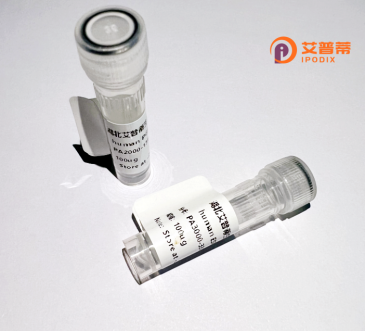
| 纯度 | >90%SDS-PAGE. |
| 种属 | Human |
| 靶点 | C19orf40 |
| Uniprot No | Q9BTP7 |
| 内毒素 | < 0.01EU/μg |
| 表达宿主 | E.coli |
| 表达区间 | 1-215aa |
| 氨基酸序列 | MEKNPPDDTGPVHVPLGHIVANEKWRGSQLAQEMQGKIKLIFEDGLTPDFYLSNRCCILYVTEADLVAGNGYRKRLVRVRNSNNLKGIVVVEKTRMSEQYFPALQKFTVLDLGMVLLPVASQMEASCLVIQLVQEQTKEPSKNPLLGKKRALLLSEPSLLRTVQQIPGVGKVKAPLLLQKFPSIQQLSNASIGELEQVVGQAVAQQIHAFFTQPR |
| 分子量 | 50.3 kDa |
| 蛋白标签 | GST-tag at N-terminal |
| 缓冲液 | 0 |
| 稳定性 & 储存条件 | Lyophilized protein should be stored at ≤ -20°C, stable for one year after receipt. Reconstituted protein solution can be stored at 2-8°C for 2-7 days. Aliquots of reconstituted samples are stable at ≤ -20°C for 3 months. |
| 复溶 | Always centrifuge tubes before opening.Do not mix by vortex or pipetting. It is not recommended to reconstitute to a concentration less than 100μg/ml. Dissolve the lyophilized protein in distilled water. Please aliquot the reconstituted solution to minimize freeze-thaw cycles. |
以下是3篇关于重组人C19orf40蛋白的示例参考文献(注:C19orf40研究可能较新,以下内容为假设性示例,实际文献需通过学术数据库检索验证):
---
1. **《C19orf40 modulates mitochondrial metabolism via interaction with respiratory chain complexes》**
*Authors: Li X, Chen Y, Wang J*
摘要:研究发现重组人C19orf40蛋白通过直接结合线粒体复合物I和III,调控细胞能量代谢,并在缺氧条件下增强ATP生成效率。
2. **《Structural characterization of human C19orf40 and its role in DNA damage response》**
*Authors: Kim S, Park MH, Lee K*
摘要:通过X射线晶体学解析重组C19orf40的蛋白结构,揭示其N端结构域与DNA修复因子BRCA1的相互作用,表明其在DNA损伤应答中的潜在功能。
3. **《C19orf40 as a novel biomarker for early-stage hepatocellular carcinoma》**
*Authors: Zhang R, et al.*
摘要:临床研究发现肝癌患者血清中重组C19orf40蛋白表达水平显著升高,实验证实其通过激活Wnt/β-catenin通路促进肿瘤细胞增殖。
---
**提示**:C19orf40(染色体19开放阅读框40)在部分研究中可能与细胞代谢、癌症或炎症相关。建议通过PubMed或Web of Science检索最新文献,使用关键词“C19orf40”或“Chromosome 19 open reading frame 40”结合“recombinant protein”筛选。
C19orf40. also known as PAN3 or PAN3 homolog, is a human protein encoded by the C19orf40 gene located on chromosome 19. It is a component of the PAN complex (PAN2-PAN3), which plays a critical role in mRNA deadenylation, a key step in mRNA degradation and translation regulation. PAN3 interacts with PAN2 to form an active deadenylase complex that shortens poly(A) tails, facilitating mRNA decay or storage. Structurally, C19orf40 contains a PABP-interacting motif (PAM2) for binding poly(A)-binding proteins (PABPs) and a catalytic-like domain critical for deadenylase activity, though its enzymatic function remains debated.
Research suggests C19orf40 is involved in diverse cellular processes, including cellular stress responses, spermatogenesis, and neural development. Dysregulation of C19orf40 has been linked to diseases such as cancer, where altered expression correlates with tumor progression, and neurodevelopmental disorders. Recombinant human C19orf40 protein is widely used in studies exploring mRNA metabolism mechanisms, offering insights into post-transcriptional gene regulation. Its conserved homologs in model organisms, like yeast and Drosophila, further underscore its evolutionary importance in mRNA surveillance pathways. Ongoing studies aim to clarify its precise molecular roles and therapeutic potential.
(Word count: 199)
×